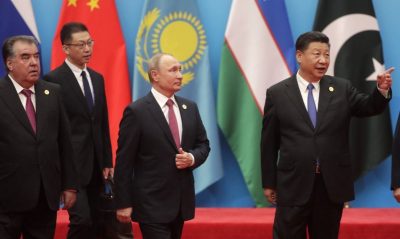The World Transformed and No One in America Noticed

The world transformed and nobody in the West noticed. India and Pakistan have joined the Shanghai Cooperation Organization. The 17 year-old body since its founding on June 15, 2001 has quietly established itself as the main alliance and grouping of nations across Eurasia. Now it has expanded from six nations to eight, and the two new members are the giant nuclear-armed regional powers of South Asia, India, with a population of 1.324 billion and Pakistan, with 193.2 million people (both in 2016).
In other words, the combined population of the SCO powers or already well over 1.5 billion has virtually doubled at a single stroke.
The long-term global consequences of this development are enormous. It is likely to prove the single most important factor insuring peace and removing the threat of nuclear war over South Asia and from 20 percent of the human race. It now raises the total population of the world in the eight SCO nations to 40 percent, including one of the two most powerful thermonuclear armed nations (Russia) and three other nuclear powers (China, India and Pakistan).
This development is a diplomatic triumph especially for Moscow. Russia has been seeking for decades to ease its longtime close strategic ally India into the SCO umbrella. This vision was clearly articulated by one of Russia’s greatest strategic minds of the 20th century, former Premier and Foreign Minister Yevgeny Primakov, who died in 2015. In the past China quietly but steadfastly blocked the India’s accession, but with Pakistan, China’s ally joining at the same time, the influence of Beijing and Moscow is harmonized.
The move can only boost Russia’s already leading role in the diplomacy and national security of the Asian continent. For both Beijing and Delhi, the road for good relations with each other and the resolution of issues such as sharing the water resources of the Himalayas and investing in the economic development of Africa now runs through Moscow. President Vladimir Putin is ideally placed to be the regular interlocutor between the two giant nations of Asia.
The move also must be seen as a most significant reaction by India to the increasing volatility and unpredictability of the United States in the global arena. In Washington and Western Europe, it is fashionable and indeed reflexively inevitable that this is entirely blamed on President Donald Trump.
But in reality this alarming trend goes back at least to the bombing of Kosovo by the United States and its NATO allies in 1998, defying the lack of sanction in international law for any such action at the time because other key members of the United Nations Security Council opposed it.
Since then, under four successive presidents, the US appetite for unpredictable military interventions around the world – usually bungled and open-ended – has inflicted suffering and instability on a wide range of nations, primarily in the Middle East (Iraq, Syria, Libya and Yemen) but also in Eurasia (Ukraine) and South Asia (Afghanistan).
The accession of both India and Pakistan to the SCO is also a stunning repudiation of the United States.
The US has been Pakistan’s main strategic ally and protector over the past more than 70 years since it achieved independence (Dean Acheson, secretary of state through the 1949-53 Truman administration was notorious for his racist contempt for all Indians, as well as for his anti-Semitism and hatred of the Irish).
US-Pakistan relations have steadily deteriorated even since the United States charged into Afghanistan in November 2001, but through it all, US policymakers have always taken for granted that Islamabad at the end of the day would “stay on the reservation” and ultimately dance to their tune.
The United States has courted India for 17 years since President Bill Clinton’s state visit in 2000, which I covered in his press party. Current Indian Prime Minister Narendra Modi addressed a Joint Session of Congress in 2016, the ultimate accolade of approval by the US political establishment for any foreign leader.
US policymakers and pundits have endlessly pontificated that India, as an English speaking democracy would become America‘s ideological and strategic partner in opposing the inevitable rise of China on the world stage. It turned out to be a fantasy.
During the era of the Cold War, the “loss” of any nation of the size and standing of India or Pakistan to a rival or just independent ideological camp and security grouping would have provoked waves of shock, hurt, rage and even openly expressed fear in the US media.
However, what we have seen following this latest epochal development is far more extraordinary. The decisions by Delhi and Islamabad have not been praised, condemned or even acknowledged in the mainstream of US political and strategic debate. They have just been entirely ignored. To see the leaders and opinion-shapers of a major superpower that still imagines it is the dominant hyper-power conduct its affairs in this way is potentially worrying and alarming.
The reality is that we live in a multipolar world – and that we have clearly done so at least since 2001. However, this obvious truth will continue to be denied in Washington, London and Paris in flat defiance of the abundantly clear facts.
*
During his 24 years as a senior foreign correspondent for The Washington Times and United Press International, Martin Sieff reported from more than 70 nations and covered 12 wars. He has specialized in US and global economic issues.
Featured image is from the author.

